Talented, temperamental and tragic, Mario Lanza (1921–1959) was an American tenor, actor and Hollywood film star of the late 1940s and the 1950s. His masterpiece was The Great Caruso (Richard Thorpe, 1951), the top-grossing film in the world in 1951. Lanza's voice was so dazzling that an awestruck Arturo Toscanini called it the ‘voice of the century’. He was the first singer to ever earn gold records, with million sellers in both classical and popular categories. Lanza was known to be rebellious, tough, and ambitious. He suffered from addictions to overeating and alcohol, which had a serious effect on his health and his career. Lanza died at the age of 38.
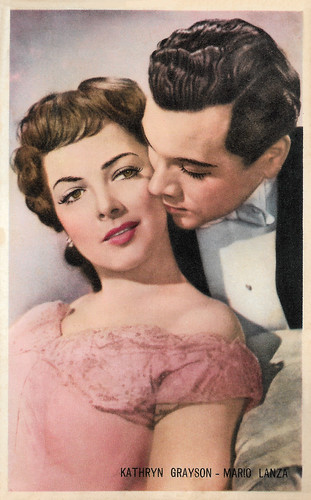
Belgian collector card by Kwatta, Bois d'Haine, no. C 298. Photo: Metro-Goldwyn-Mayer. Kathryn Grayson and Mario Lanza in That Midnight Kiss (Norman Taurog, 1949).
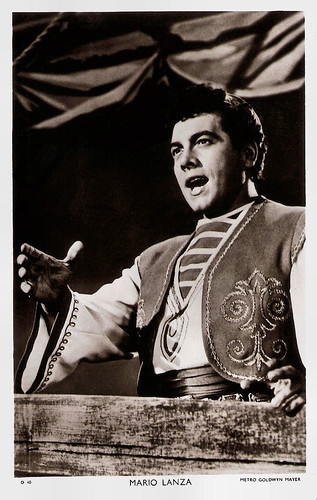
British postcard in the Picturegoer Series, London, no. D 40. Photo: Metro-Goldwyn-Mayer. Publicity still for The Great Caruso (Richard Thorpe, 1951).
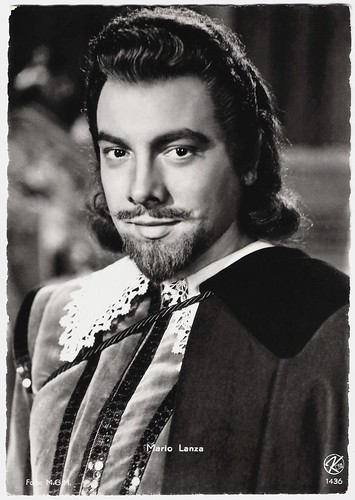
Austrian postcard by Kellner Fotokarten, Wien, no. 1436. Photo: MGM. Publicity still for The Great Caruso (Richard Thorpe, 1951).

Belgian collectors card by Kwatta, Bois d'Haine. Photo: M.G.M. Publicity still for The Toast of New Orleans (Norman Tautog, 1950).
Mario Lanza was born Alfredo Arnold Cocozza in 1921 in South Philadelphia, Pennsylvania. Mario was exposed to opera and classical singing at an early age by his Abruzzese-Molisan Italian parents. In 1940, he began studying repertoire with soprano Irene Williams. Two years later, he came to the attention of the celebrated conductor Serge Koussevitzky, who promptly invited him to the Berkshire Music Festival in Tanglewood on a full scholarship. It was here, at Koussevitzky’s urging, that Alfred Cocozza became Mario Lanza—the masculine form of his mother’s name (Maria Lanza).
The young tenor made his opera debut as Fenton in Otto Nicolai's 'The Merry Wives of Windsor'at the Berkshire Music Festival in Tanglewood in August 1942, after just six weeks of intensive study with conductors Boris Goldovsky and Leonard Bernstein. In the New York Times, noted music critic Noel Straus hailed the 21-year-old Lanza as “an extremely talented, if as yet not completely routined student, whose superb natural voice has few equals among tenors of the day in quality, warmth, and power.”
His budding operatic career was interrupted by World War II, when he was assigned to Special Services in the U.S. Army Air Corps. He appeared in the wartime shows On the Beam and Winged Victory. He also appeared in the film version of the latter, Winged Victory (George Cukor, 1944), albeit as an unrecognisable chorus member. In 1945 he married Betty Hicks. She was the sister of Lanza's army buddy. He was interested in her picture, and the buddy introduced them. Lanza resumed his singing career with a concert in Atlantic City with the NBC Symphony Orchestra in September 1945 under Peter Herman Adler, subsequently his mentor.
After a sensational concert at the Hollywood Bowl in 1947, the good-looking tenor signed a seven-year film contract with Louis B. Mayer, the head of Metro-Goldwyn-Mayer, who was impressed by his performance. The contract required him to commit to the studio for six months, and at first, Lanza believed he would be able to combine his film career with his operatic and concert one.
In 1948, he sang the role of Pinkerton in Puccini's 'Madame Butterfly' in New Orleans. Reviewing the opening-night performance in the St. Louis News, Laurence Oden wrote, "Mario Lanza performed ... Lieutenant Pinkerton with considerable verve and dash. Rarely have we seen a more superbly romantic leading tenor. His exceptionally beautiful voice helps immeasurably." Following the success of these performances, he was invited to return to New Orleans in 1949 as Alfredo in Verdi's 'La Traviata'. However, as biographer Armando Cesari wrote, Lanza, by 1949, "was already deeply engulfed in the Hollywood machinery and consequently never learned that role.”
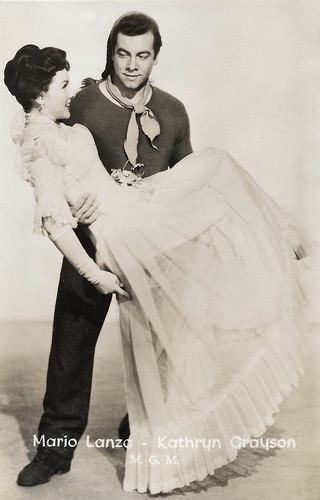
Vintage card. Photo: Metro Goldwyn Mayer. Publicity still for The Toast of New Orleans (Norman Taurog, 1950) with Kathryn Grayson.
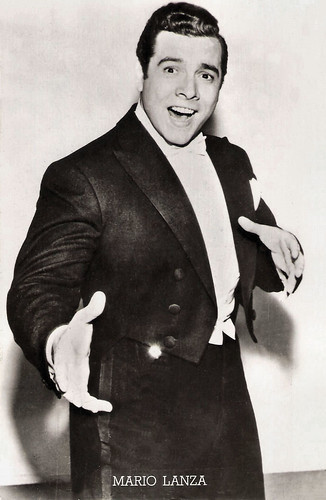
Belgian postcard, no. 452. Photo: MGM. Publicity still for The Great Caruso (Richard Thorpe, 1951).
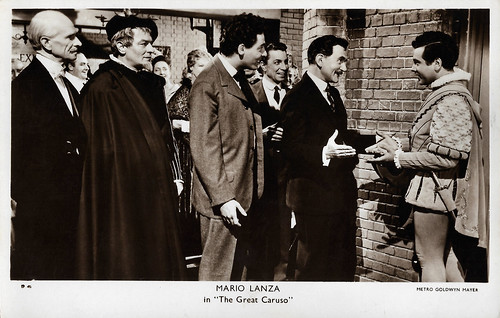
British postcard in the Picturegoer Series, London, no. D 46. Photo: Metro-Goldwyn-Mayer. Publicity still for The Great Caruso (Richard Thorpe, 1951).
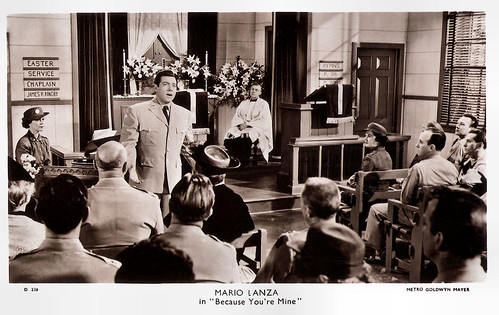
British postcard in the Picturegoer Series, London, no. D 238. Photo: Metro Goldwyn Mayer. Pubicity still for Because You're Mine (Alexander Hall, 1952).
Mario Lanza’s film debut for MGM was in the musical romance That Midnight Kiss (Norman Taurog, 1949) with top-billed Kathryn Grayson and Ethel Barrymore. According to MGM records, the film earned $1,728,000 in the US and Canada and $1,449,000 overseas, resulting in a profit of $173,000.
A year later, in The Toast of New Orleans (Norman Taurog, 1950), again opposite Kathryn Grayson, his featured popular song ‘Be My Love’ became his first million-selling hit. In 1951, he played the role of tenor Enrico Caruso, his idol, in the biopic The Great Caruso (Richard Thorpe, 1951). This film was a highly fictionalised biography of the life of the great operatic tenor and co-starred Ann Blyth and Czech soprano Jarmila Novotná. It produced another million-seller with ‘The Loveliest Night of the Year’, a song which used the melody of 'Sobre las Olas'.
The Great Caruso was the top-grossing film that year, and according to MGM records, it made $4,309,000 in the US and Canada and $4,960,000 elsewhere, resulting in a profit of $3,977,000. The film was nominated for three Academy Awards; at the 24th Academy Awards ceremony, Douglas Shearer and the MGM Studio Sound Department won for Best Sound. The film was also Oscar-nominated for its costume design and its score.
The title song of his next film, Because You're Mine (Alexander Hall, 1952), was his final million-selling hit song. The song went on to receive an Academy Award nomination for Best Original Song. Though popular at the box office, the film was not a critical success.
After recording the soundtrack for his next film, The Student Prince, he embarked upon a protracted battle with studio head Dore Schary arising from artistic differences with director Curtis Bernhardt. Lanza was eventually dismissed by MGM. The film would later be made by Richard Thorpe with Edmund Purdom as young Prince Karl, lip-synching to Lanza. The film was a big hit, but Lanza’s career began a downturn that would never be reversed.
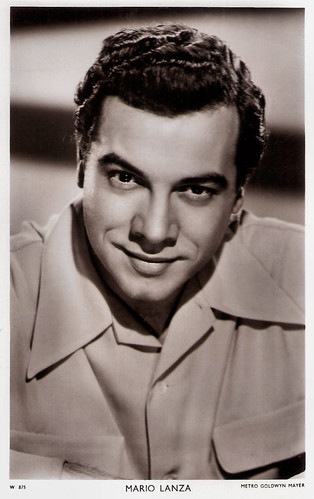
British postcard in the Picturegoer Series, London, no. W 875. Photo: Metro Goldwyn Mayer.
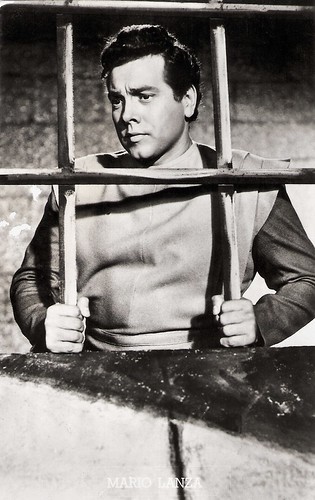
Dutch postcard, no. 152. Photo: MGM.
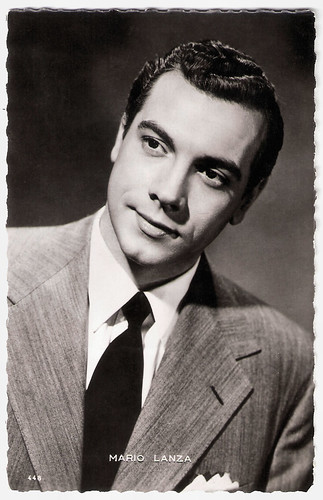
French postcard by Editions P.I., Paris, no. 448.
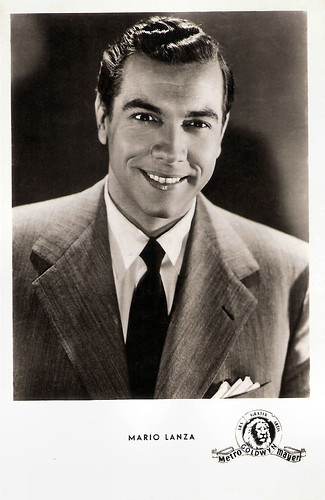
German postcard by Kunst und Bild, Berlin, no. U 361. Photo: Metro-Goldwyn-Mayer.
After four years, Mario Lanza returned to an active film career in Serenade (Anthony Mann, 1956), with Joan Fontaine and Sara Montiel, and released by Warner Bros. However the film was not as successful as his previous films, despite its strong musical content, including arias from Der Rosenkavalier, Fedora, L'arlesiana, and Otello, as well as the Act I duet from Otello with soprano Licia Albanese.
The film differs greatly from the James M. Cain source novel. In the book, the male protagonist is John Howard Spring, a professional opera singer who has lost his voice and fled the United States to Mexico in a crisis of confidence after being sexually wooed (not unsuccessfully, though details are vague) by a male socialite and impresario. Juana Montes is a Mexican prostitute who sees Spring as gay and therefore a trouble-free partner to open a brothel with. But after having sex in a deserted church with Juana, Spring recovers his voice and his preferred sexual identity. The two lovers come into conflict with the local police and flee to Los Angeles, where Spring reestablishes his singing career, more successful than ever. But once they move to New York, the singer must struggle against the renewed blandishments of the gay impresario, whom Juana eventually murders with a torero's sword.
As none of this material could be considered suitable for an American film in 1955, the story's male impresario becomes female instead and the Mexican prostitute becomes a Mexican bullfighter's daughter. The film made a purported loss of $695,000. Lanza then moved to Rome, Italy in May 1957, where he worked on the film Arrivederci Roma/Seven Hills of Rome (Roy Rowland, 1958) with the gorgeous Marisa Allasio. He returned to live performing in November of that year, singing for Queen Elizabeth II at the Royal Variety Show at the London Palladium. From January to April 1958, Lanza gave a concert tour of the UK, Belgium, the Netherlands, France and Germany.
During most of his film career, Lanza suffered from addictions to overeating and alcohol which had a serious effect on his health and his relationships with directors, producers and, occasionally, other cast members. In September 1958, he made a number of operatic recordings at the Rome Opera House for the soundtrack of what would turn out to be his final film, For the First Time (Rudolph Mate, 1959) with Johanna von Koczian and Zsa Zsa Gabor. Howard Thompson of The New York Times called it Lanza’s "most disarming vehicle in years." The Rome Opera’s artistic director, Riccardo Vitale, offered the tenor carte blanche in his choice of operatic roles. Lanza also received offers to sing in any opera of his choosing from the San Carlo in Naples. At the same time, however, his health continued to decline, with the tenor suffering from a variety of ailments, including phlebitis and acute high blood pressure. His old habits of overeating and crash dieting, coupled with binge drinking, compounded his problems.
In 1959, Mario Lanza died of an apparent pulmonary embolism in Rome, at the age of 38. At the time of his death, he had agreed to sing the role of Canio for the Rome Opera’s 1960-1961 season, but Lanza’s dream of becoming a great opera star remained unfulfilled. He was survived by his wife and four children. Betty Lanza returned to Hollywood completely devastated. She died five months later of a drug overdose. Derek McGovern at Opera Vivrá: “He left behind an uneven but astonishingly diverse legacy of operatic recordings—some of which rank alongside the best efforts of more celebrated practitioners—together with Neapolitan songs, English love songs, and operetta; and seven operatically flavored films.“ Jeff Rense at IMDb: “Lanza's seven films and scores of astonishing recordings continue to stun and inspire singers and the public 40 years after his death. He is celebrated and honored with film festivals, a steady flow of new Cd's, and constant worldwide musical tributes.” Lanza has been a major influence on the generation of tenors who came after him. Luciano Pavarotti, Plácido Domingo, José Carreras, Andrea Bocelli, and Roberto Alagna all credit Lanza as an inspiration to them in pursuing their chosen careers.

German postcard by Kolibri-Verlag G.m.b.H., Minden/Westf, no. 714. Photo: Warner Bros. Publicity still for Serenade (Anthony Mann, 1956).
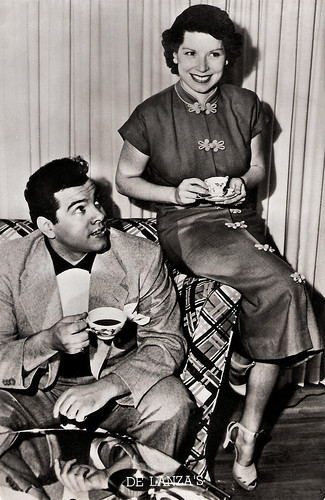
Dutch postcard. Photo: MGM. Tea time with Mario Lanza and his wife Betty Hicks Lanza.
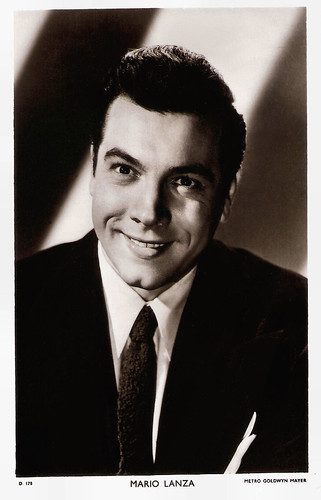
British postcard in the Picturegoer Series, London, no. D 178. Photo: Metro-Goldwyn-Mayer.

East-German postcard by VEB Progress Film-Vertrieb, Berlin, no. 2106, 1964. Photo: publicity still for For the First Time (Rudolph Maté, 1959) with Johanna von Koczian.
Sources: Derek McGovern (Opera Vivrá), Jeff Rense (IMDb), Wikipedia and IMDb.
This post was last updated on 28 February 2025.

Belgian collector card by Kwatta, Bois d'Haine, no. C 298. Photo: Metro-Goldwyn-Mayer. Kathryn Grayson and Mario Lanza in That Midnight Kiss (Norman Taurog, 1949).

British postcard in the Picturegoer Series, London, no. D 40. Photo: Metro-Goldwyn-Mayer. Publicity still for The Great Caruso (Richard Thorpe, 1951).

Austrian postcard by Kellner Fotokarten, Wien, no. 1436. Photo: MGM. Publicity still for The Great Caruso (Richard Thorpe, 1951).

Belgian collectors card by Kwatta, Bois d'Haine. Photo: M.G.M. Publicity still for The Toast of New Orleans (Norman Tautog, 1950).
A sensational concert at the Hollywood Bowl
Mario Lanza was born Alfredo Arnold Cocozza in 1921 in South Philadelphia, Pennsylvania. Mario was exposed to opera and classical singing at an early age by his Abruzzese-Molisan Italian parents. In 1940, he began studying repertoire with soprano Irene Williams. Two years later, he came to the attention of the celebrated conductor Serge Koussevitzky, who promptly invited him to the Berkshire Music Festival in Tanglewood on a full scholarship. It was here, at Koussevitzky’s urging, that Alfred Cocozza became Mario Lanza—the masculine form of his mother’s name (Maria Lanza).
The young tenor made his opera debut as Fenton in Otto Nicolai's 'The Merry Wives of Windsor'at the Berkshire Music Festival in Tanglewood in August 1942, after just six weeks of intensive study with conductors Boris Goldovsky and Leonard Bernstein. In the New York Times, noted music critic Noel Straus hailed the 21-year-old Lanza as “an extremely talented, if as yet not completely routined student, whose superb natural voice has few equals among tenors of the day in quality, warmth, and power.”
His budding operatic career was interrupted by World War II, when he was assigned to Special Services in the U.S. Army Air Corps. He appeared in the wartime shows On the Beam and Winged Victory. He also appeared in the film version of the latter, Winged Victory (George Cukor, 1944), albeit as an unrecognisable chorus member. In 1945 he married Betty Hicks. She was the sister of Lanza's army buddy. He was interested in her picture, and the buddy introduced them. Lanza resumed his singing career with a concert in Atlantic City with the NBC Symphony Orchestra in September 1945 under Peter Herman Adler, subsequently his mentor.
After a sensational concert at the Hollywood Bowl in 1947, the good-looking tenor signed a seven-year film contract with Louis B. Mayer, the head of Metro-Goldwyn-Mayer, who was impressed by his performance. The contract required him to commit to the studio for six months, and at first, Lanza believed he would be able to combine his film career with his operatic and concert one.
In 1948, he sang the role of Pinkerton in Puccini's 'Madame Butterfly' in New Orleans. Reviewing the opening-night performance in the St. Louis News, Laurence Oden wrote, "Mario Lanza performed ... Lieutenant Pinkerton with considerable verve and dash. Rarely have we seen a more superbly romantic leading tenor. His exceptionally beautiful voice helps immeasurably." Following the success of these performances, he was invited to return to New Orleans in 1949 as Alfredo in Verdi's 'La Traviata'. However, as biographer Armando Cesari wrote, Lanza, by 1949, "was already deeply engulfed in the Hollywood machinery and consequently never learned that role.”

Vintage card. Photo: Metro Goldwyn Mayer. Publicity still for The Toast of New Orleans (Norman Taurog, 1950) with Kathryn Grayson.

Belgian postcard, no. 452. Photo: MGM. Publicity still for The Great Caruso (Richard Thorpe, 1951).

British postcard in the Picturegoer Series, London, no. D 46. Photo: Metro-Goldwyn-Mayer. Publicity still for The Great Caruso (Richard Thorpe, 1951).

British postcard in the Picturegoer Series, London, no. D 238. Photo: Metro Goldwyn Mayer. Pubicity still for Because You're Mine (Alexander Hall, 1952).
Million-selling hit songs
Mario Lanza’s film debut for MGM was in the musical romance That Midnight Kiss (Norman Taurog, 1949) with top-billed Kathryn Grayson and Ethel Barrymore. According to MGM records, the film earned $1,728,000 in the US and Canada and $1,449,000 overseas, resulting in a profit of $173,000.
A year later, in The Toast of New Orleans (Norman Taurog, 1950), again opposite Kathryn Grayson, his featured popular song ‘Be My Love’ became his first million-selling hit. In 1951, he played the role of tenor Enrico Caruso, his idol, in the biopic The Great Caruso (Richard Thorpe, 1951). This film was a highly fictionalised biography of the life of the great operatic tenor and co-starred Ann Blyth and Czech soprano Jarmila Novotná. It produced another million-seller with ‘The Loveliest Night of the Year’, a song which used the melody of 'Sobre las Olas'.
The Great Caruso was the top-grossing film that year, and according to MGM records, it made $4,309,000 in the US and Canada and $4,960,000 elsewhere, resulting in a profit of $3,977,000. The film was nominated for three Academy Awards; at the 24th Academy Awards ceremony, Douglas Shearer and the MGM Studio Sound Department won for Best Sound. The film was also Oscar-nominated for its costume design and its score.
The title song of his next film, Because You're Mine (Alexander Hall, 1952), was his final million-selling hit song. The song went on to receive an Academy Award nomination for Best Original Song. Though popular at the box office, the film was not a critical success.
After recording the soundtrack for his next film, The Student Prince, he embarked upon a protracted battle with studio head Dore Schary arising from artistic differences with director Curtis Bernhardt. Lanza was eventually dismissed by MGM. The film would later be made by Richard Thorpe with Edmund Purdom as young Prince Karl, lip-synching to Lanza. The film was a big hit, but Lanza’s career began a downturn that would never be reversed.

British postcard in the Picturegoer Series, London, no. W 875. Photo: Metro Goldwyn Mayer.

Dutch postcard, no. 152. Photo: MGM.

French postcard by Editions P.I., Paris, no. 448.

German postcard by Kunst und Bild, Berlin, no. U 361. Photo: Metro-Goldwyn-Mayer.
Overeating, crash dieting, coupled with binge drinking
After four years, Mario Lanza returned to an active film career in Serenade (Anthony Mann, 1956), with Joan Fontaine and Sara Montiel, and released by Warner Bros. However the film was not as successful as his previous films, despite its strong musical content, including arias from Der Rosenkavalier, Fedora, L'arlesiana, and Otello, as well as the Act I duet from Otello with soprano Licia Albanese.
The film differs greatly from the James M. Cain source novel. In the book, the male protagonist is John Howard Spring, a professional opera singer who has lost his voice and fled the United States to Mexico in a crisis of confidence after being sexually wooed (not unsuccessfully, though details are vague) by a male socialite and impresario. Juana Montes is a Mexican prostitute who sees Spring as gay and therefore a trouble-free partner to open a brothel with. But after having sex in a deserted church with Juana, Spring recovers his voice and his preferred sexual identity. The two lovers come into conflict with the local police and flee to Los Angeles, where Spring reestablishes his singing career, more successful than ever. But once they move to New York, the singer must struggle against the renewed blandishments of the gay impresario, whom Juana eventually murders with a torero's sword.
As none of this material could be considered suitable for an American film in 1955, the story's male impresario becomes female instead and the Mexican prostitute becomes a Mexican bullfighter's daughter. The film made a purported loss of $695,000. Lanza then moved to Rome, Italy in May 1957, where he worked on the film Arrivederci Roma/Seven Hills of Rome (Roy Rowland, 1958) with the gorgeous Marisa Allasio. He returned to live performing in November of that year, singing for Queen Elizabeth II at the Royal Variety Show at the London Palladium. From January to April 1958, Lanza gave a concert tour of the UK, Belgium, the Netherlands, France and Germany.
During most of his film career, Lanza suffered from addictions to overeating and alcohol which had a serious effect on his health and his relationships with directors, producers and, occasionally, other cast members. In September 1958, he made a number of operatic recordings at the Rome Opera House for the soundtrack of what would turn out to be his final film, For the First Time (Rudolph Mate, 1959) with Johanna von Koczian and Zsa Zsa Gabor. Howard Thompson of The New York Times called it Lanza’s "most disarming vehicle in years." The Rome Opera’s artistic director, Riccardo Vitale, offered the tenor carte blanche in his choice of operatic roles. Lanza also received offers to sing in any opera of his choosing from the San Carlo in Naples. At the same time, however, his health continued to decline, with the tenor suffering from a variety of ailments, including phlebitis and acute high blood pressure. His old habits of overeating and crash dieting, coupled with binge drinking, compounded his problems.
In 1959, Mario Lanza died of an apparent pulmonary embolism in Rome, at the age of 38. At the time of his death, he had agreed to sing the role of Canio for the Rome Opera’s 1960-1961 season, but Lanza’s dream of becoming a great opera star remained unfulfilled. He was survived by his wife and four children. Betty Lanza returned to Hollywood completely devastated. She died five months later of a drug overdose. Derek McGovern at Opera Vivrá: “He left behind an uneven but astonishingly diverse legacy of operatic recordings—some of which rank alongside the best efforts of more celebrated practitioners—together with Neapolitan songs, English love songs, and operetta; and seven operatically flavored films.“ Jeff Rense at IMDb: “Lanza's seven films and scores of astonishing recordings continue to stun and inspire singers and the public 40 years after his death. He is celebrated and honored with film festivals, a steady flow of new Cd's, and constant worldwide musical tributes.” Lanza has been a major influence on the generation of tenors who came after him. Luciano Pavarotti, Plácido Domingo, José Carreras, Andrea Bocelli, and Roberto Alagna all credit Lanza as an inspiration to them in pursuing their chosen careers.

German postcard by Kolibri-Verlag G.m.b.H., Minden/Westf, no. 714. Photo: Warner Bros. Publicity still for Serenade (Anthony Mann, 1956).

Dutch postcard. Photo: MGM. Tea time with Mario Lanza and his wife Betty Hicks Lanza.

British postcard in the Picturegoer Series, London, no. D 178. Photo: Metro-Goldwyn-Mayer.

East-German postcard by VEB Progress Film-Vertrieb, Berlin, no. 2106, 1964. Photo: publicity still for For the First Time (Rudolph Maté, 1959) with Johanna von Koczian.
Sources: Derek McGovern (Opera Vivrá), Jeff Rense (IMDb), Wikipedia and IMDb.
This post was last updated on 28 February 2025.
No comments:
Post a Comment